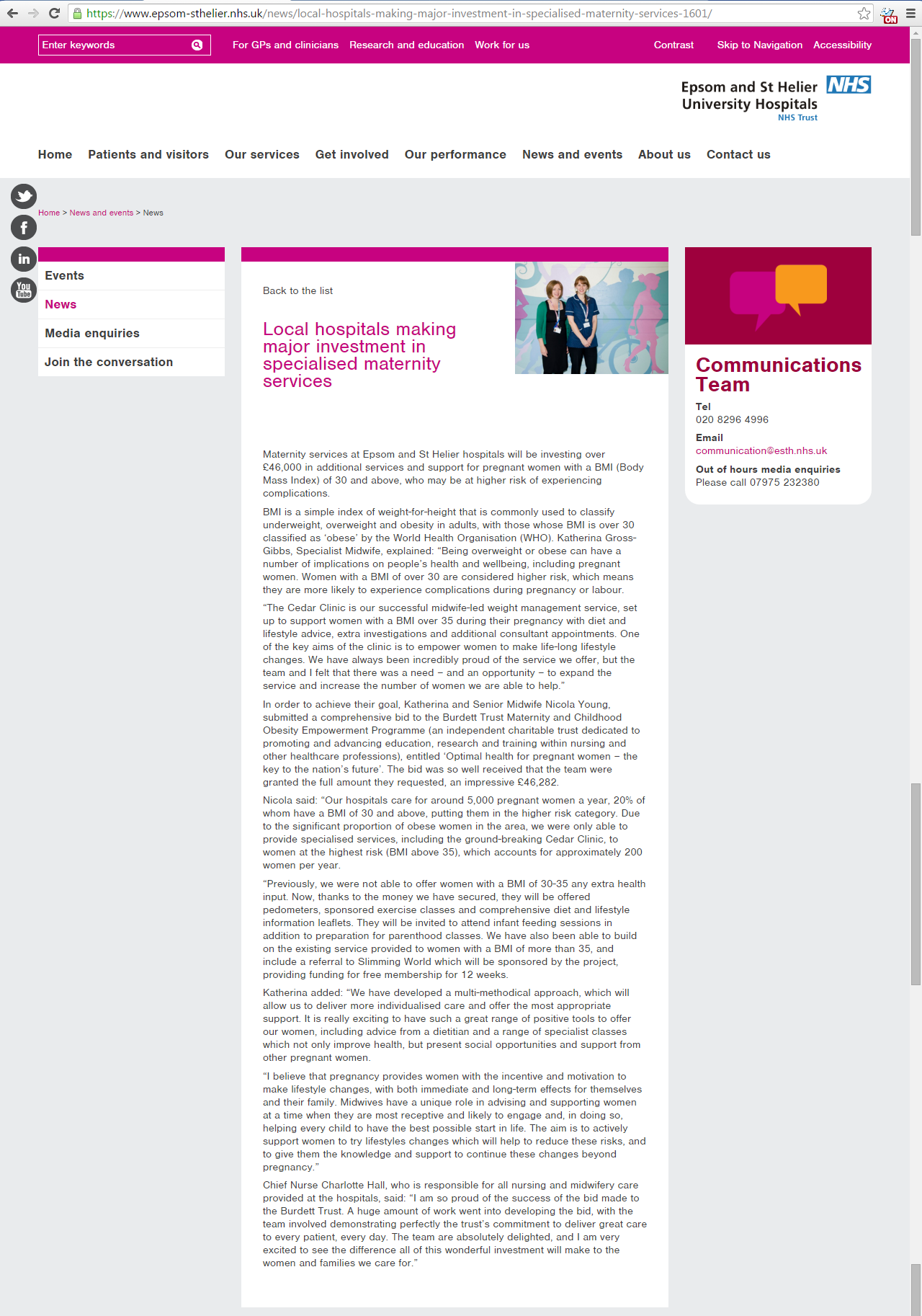The Epsom & St Helier Trust have today announced that they have secured a "grant" from a charitable trust, of £46,282 to help overweight expectant mothers lose weight.
On the face of it, this looks like good news, but as is so often the case with these things, the devil is in the detail.
Charity vs. Department of Health funding
Firstly, the money in question has not been secured from the Department of Health - it has come from a charitable trust. While funding from any source is surely welcome, we at KOSHH believe that funding for vital medical services should not be reliant on charity.
Aside from the fact that donations from charities can come and go, the NHS as originally conceived, is paid for by everyone paying into the system via the taxes they pay - that way, everyone pays a little and society as a whole benefits from everyone's health being better. In turn, this makes society more economically productive, which more than offsets the "cost" - in fact spending on health is a fiscal multiplier - that is to say that for every pound spent on health, society is better off by more than one pound.
How much per person?
The report explains that this new grant will allow the hospital to provide services to 20% of the 5,000 or so women who give birth within the trust each year. This equates to approximately 1,000 cases per year. As a very loose guide (and of course, it is not quite this simple), if we divide the grant of £46,282 by the 1,000 cases, we get a rough figure of £46.28 spent per person served.
What is this money going to pay for?
The press release says that they will now be able to offer "Pedometers, sponsored exercise classes and comprehensive diet and lifestyle information leaflets", it goes on to say "a referral to Slimming World which will be sponsored by the project, providing funding for free membership for 12 weeks". While all of the above is surely very helpful, the inclusion of membership with Slimming World is of particular concern.
The press release does not make it clear how much of the grant is going to be spent with Slimming World, and for reasons which will become clear, it is unlikely that a Freedom of Information request to the trust will provide the answer to this question.
Looking at the Slimming World website, it would appear that the advertised price is £4.95 per person, per week, assuming a 6 or 12 week sign up.
The press release says that they will include a "free" membership for 12 weeks. A rough estimate for the retail price for such membership, would be 12 x £4.95 = £59.40 - which is remarkably close to the £46.28 available per person!
What's wrong with the NHS contracting out to Slimming World?
While companies such as Slimming World are no doubt, very good at helping their customer's lose weight, the trust does already have it's own, in-house, weight management specialists. The use of an external contractor amounts to yet more privatisation of your NHS, and KOSHH objects to this in the strongest terms.
Some of the reasons why privatisation of the NHS is a very bad thing.
- When the public sector NHS provides a service, it does not need to turn a profit. Therefore the number one priority of the people providing the service can be the healthcare of it's patients. Conversely, company law dictates that the directors of a private company MUST act in a way which maximises the company's profits.
- In order to maximise profits, private companies have a number of options, but high on the list of options are providing less, and reducing the quality of the service.
- When a service is provided by the public sector NHS, it's employees are entitled to the working terms and conditions of the public sector. While these are far from perfect, they do provide a baseline of protection against working too many hours, proper pay, and pensions etc. The private sector, as detailed in points 1 and 2, have a legal duty to minimise their expenditure to maximise profits, and reducing the amount spent on their staff is one way to achieve this.
- The public sector NHS is bound by the Freedom of Information Act. This permits members of the public to make enquiries as to how public funding is being used, and whether good value for money is being achieved. Private companies contracted by the NHS, even though they are being paid with public money, are exempt from this act, which is a massive barrier to true transparency.
- Private companies are generally only interested in providing services which are low risk, and offer a good profit. With the NHS in the process of being privatised, private providers will bid to offer services which offer high profits and low risk, leaving the public sector NHS to pick up all of the high risk services, which tend to offer a lower financial "reward", which disproportionately makes the public sector NHS appear to be more expensive. Eventually, a point will be reached where the NHS is no longer financially viable, and we will all be forced to take out "US style" private health insurance policies, which have been proven to be un-affordable to most people, and the quality of care is generally far below that which we enjoy at the moment.
- When patients are referred to private providers, in the case of a patient suffering harm, accountability is blurred.
- It is yet another way of moving public money into private pockets. In many cases, the private companies in question have arranged their financial affairs overseas, using clever accounting techniques in order to minimise the amount of tax they pay. Tax avoidance is yet another example of private companies maximising their profits, but doing so means that there is less public money available to pay for things like schools, roads, care for the elderly, and of course, the NHS. By doing this, these companies make all of us in this country poorer.
KOSHH demands
The health service must be returned to the founding principles of the NHS. It must be:
- Publicly delivered (i.e. no involvement from the private sector)
- Publicly funded (through general taxation of individuals and companies)
- Publicly accountable (whereby the Health Secretary is returned to having a legal duty to provide a National Health Service - this responsibility was removed by the Health and Social Care Act 2012)
- Free at the point of delivery (great care must be taken with this demand, as car insurance is technically "free at the point of use", but of course you need to pay your premium for cover)
The press release from the trust, in full, is captured below for your reference:



















